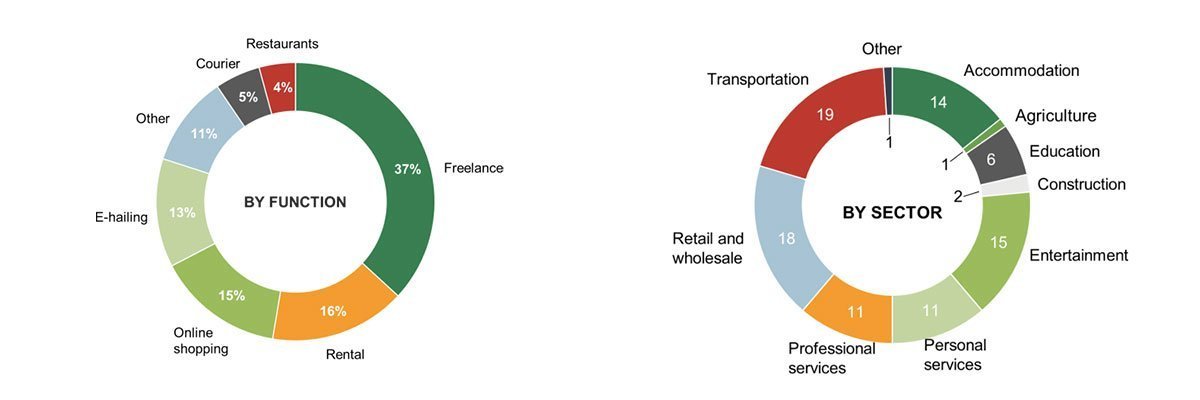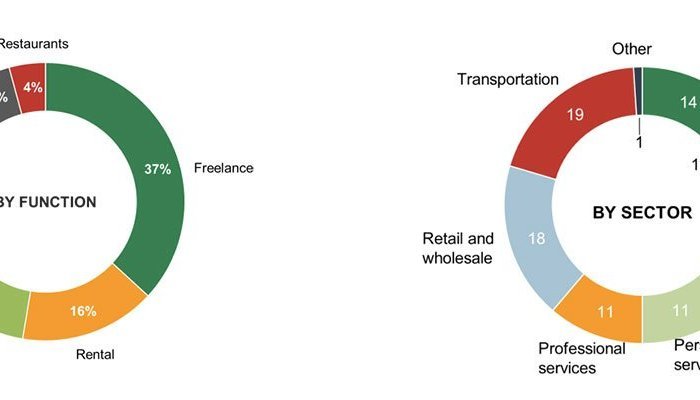Digitalisation really is changing the way that society and business work, but navigating such a disruptive environment is not for the faint-hearted. For example, local hero Discovery is at once the poster child for the potential inherent in digitalisation, and its pitfalls.
Digitalisation poses several challenges for South Africa. One is that the Fourth Industrial Revolution (4IR) will inevitably reduce the number of jobs available in manufacturing, mining and other sectors via automation and increasing the use of robotics. Another is that it will require a great number of high-level skills in areas like digital science, skills which are in short supply globally and certainly in this country. Both trends, it is presumed, will spell disaster for our large and predominantly low-skilled workforce.
...what are the income-generating opportunities that the digital revolution is opening up for South Africa?
Andrew Yang, until recently a Democratic presidential candidate, has built his political career on the proposition that some sort of universal wage is needed to counteract the growing unemployment that digitalisation will cause, and thus to protect the economy. Many commentators on 4IR, however, put forward an alternate view: that the digitalisation of business will create more jobs than it will destroy, just different kinds of jobs.
On the home front, it is quite noticeable how the digital revolution, and particularly 4IR, feature heavily in government plans for combatting the unemployment crisis, most notably in this and last year’s SONA. Government is to be congratulated for its willingness to take King Canute’s lesson to heart, but a weary citizenry can perhaps be forgiven for reacting to brightly coloured dreams of smart cities with some cynicism.
SADA is a welcome initiative to apply some rigour to the notion of digitalisation, particularly what income-generating opportunities the digital revolution might open for South Africans. This strategy primer was backed by the Bill and Melinda Gates Foundation and the Blavatnik School of Government at Oxford, and the SADA project team included GIBS faculty members Abdullah Verachia and Marius Oosthuizen. Professor Nick Binedell co-chaired the project team with Stephan Malherbe of Genesis Consulting.
“Everybody agrees that technology is having a significant impact on society, but there is less on what society can do proactively to ensure that the impact is positive,” says Verachia. “More specifically, what are the income-generating opportunities that the digital revolution is opening up for South Africa? It’s too often assumed that digitalisation and 4IR, in particular, will lead to the loss of lower-skilled jobs, so a focus was the potential for digitalisation to create jobs in that area.”
Based on its extensive interactions with experts and other role-players, SADA concluded that the digital revolution offers three main job-creating opportunities for South Africa, namely exporting services, unlocking demand for low-skilled labour, and establishing South Africa as a frontier technology hub.
Exporting services globally at scale
Traditionally, global trade involved commodities, an area in which South Africa is well endowed, and manufactured goods, an area in which South Africa has declined significantly. However, there has been strong growth in the export of services globally, and SADA concludes that this area offers real opportunity for the country.
India successfully set itself up as a business process outsourcing (BPO) hub in the 1990s thanks to extraordinary public-private cooperation. Key initiatives included tax advantages for BPO companies and dedicated universities to provide people with the necessary skills. The result was 3.4 million direct and 6.4 million indirect jobs.
Business schools are well placed to play the coordinating role, bringing government and the private sector together.
The same type of result is possible here, SADA says, by focusing not only on call centre work but also coding, other ICT services, and finance, accounting and legal support. The list could be expanded to include new services such as tutoring and medical support. These global business services already provide work to 250,000 South Africans, and the category is growing at 24%, which is one of the few job categories enjoying significant growth.
Verachia says that it is important to distinguish between services jobs that require high skills and those requiring lower ones.
In collaboration with the Department of Trade and Industry (DTI) and the industry body BPESA (Business Process Enabling South Africa), SADA has identified five levers that, if activated with sufficient urgency and scale, could generate an extra 100,000 jobs by 2023 and 500,000 by 2030. These levers are:
- Expansion in target source markets
- Reshoring work currently done offshore for SA companies
- Growing shared services in niche areas
- Developing ICT/digital outsourcing
- Growing new types of personalised services
“It’s important to recognise that government is not the driver of this process, but rather a key participant. An inclusive approach is vital, or the process will fail,” Verachia says. “Business schools are well placed to play the coordinating role, bringing government and the private sector together.”
Unlocking demand for low-skilled labour through digital platforms
From both a political and a social perspective, this is arguably the opportunity that should be seized with the greatest possible vigour. However, these platforms and the so-called gig economy they enable can have unexpected consequences. For example, consider Uber’s impact on taxis or Airbnb’s on property prices. Urgent dialogue is needed to defuse these flashpoints so that the potential for job creation is not lost.
SADA’s research shows that there are upwards of 90 digital platforms already operating in South Africa, at least half of which were developed locally – an excellent example of how South Africa’s entrepreneurial ICT sector can be harnessed for job growth. Figure 1 shows the sectors in which they operate and the kind of jobs they can create. For example, e-hailing platforms like Uber now provide work for some 20,000 people, even though the technology was only introduced a scant seven years ago.
Examples of other successful local platforms include Kandua (handyman), Domestly and SweepSouth (domestic), Abbi and LoadIt (transport), Mr Delivery, OrderIn, Ucook (food delivery), and Afristay and SafariNow (tourism).
“Providing adequate, cheap bandwidth is critical here, and the announcement in this year’s State of the Nation address that data costs would be lowered was welcome, though it’s

Figure 1: Digital platforms distribution by function (%) and by sector (count)
(Source: SADA, “Pathways to Digital Work” p.3)
...urgent dialogue is needed to defuse these flashpoints so that the potential for job creation is not lost.
Establishing South Africa as a frontier technology hub
The thinking here is to avoid the temptation to protect the local digital marketplace, but rather to encourage the arrival of other digital businesses. Research shows that digital businesses tend to locate their back offices in the local markets where they are situated, thus creating more jobs while also growing the domestic tax base.
“This approach will allow South Africa to position itself as a hub from which global companies can scale their businesses into the rest of Africa and globally, creating something like Silicon Valley here, a hot-house of innovation,” says Verachia. “Silicon Cape already provides such a nucleus.”
At the same time, the SADA report says, it’s vital that South Africa puts various initiatives in place to support the development of such a hub. These include a policy of digital demand creation through universal digital inclusion, better access to early-stage funding for digital enterprises, addressing the high-level skills gap, and creating new forums where government and the private sector can set joint goals and solve problems.
Reality check
So far so good, but it is also necessary to outline some of the very real barriers that stand in the way of these excellent recommendations. At present, government and business mistrust each other, and SADA’s emphasis on the role of government may dismay free marketers while communists will hanker after the developmental state in which the private sector is irrelevant, at best.
On the plus side, there is some evidence that a more pragmatic approach is emerging, driven by the urgent need to create jobs and grow the economy, and that business and certain parts of government are finding ways to collaborate successfully. A more serious challenge is posed by the brute fact that the state has become largely incapable, and thus there must be a question mark over its ability to play the key role envisaged. For example, does it have the capability to prioritise the allocation of much-needed spectrum to support the digital ecosystem, and does it have the will to put the regulatory regime in place to nurture the growth of digital businesses and new ways of working?
And, pragmatism aside, digital jobs strongly imply a new ‘income and work’ paradigm at odds with the unions’ devotion to ‘real jobs’. Does the government have the political will to put a forward-looking set of regulations in place that will protect workers while supporting business?
This document is a primer. Let’s hope both business and government use it as such.
What needs to be done?
The three job-creation opportunities identified by SADA can only be achieved if the following four imperatives are achieved:
· Universal digital inclusion as a right. To support an inclusive digital economy, data costs must be addressed, and tablets issued to all secondary-school learners to help bridge the skills gap. Government should lead the way by shifting service delivery to online platforms and find ways of helping those who are not proficient in English to enter the digital economy.
· Human capital development. The education system must be overhauled so it can produce a pipeline of workers with the right skills.
· Government support. The South African government must develop an enabling environment, particularly in the way in which it regulates both business and labour.
· Innovative business. In parallel with a supportive government, the country needs a business sector that has access to the finance needed to incubate innovative digital businesses successfully, and an ecosystem in which they will thrive, which should include collaboration with corporates.
The SADA report includes a full table of actions required for each one of these imperatives.
More information
Nick Binedell in conversation with Marius Oosthuizen and Abdullah Verachia.








